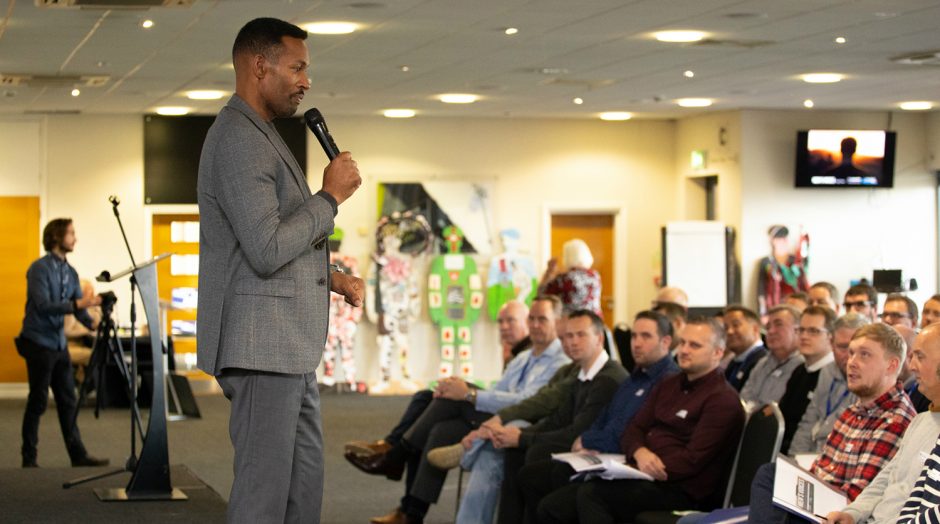Central England Co-operative had a busy 2019. As well as welcoming a new chief executive, Debbie Robinson, the society put a lot of energy into serving its members and customers, and bridging some of the gaps in the communities it serves. In November alone, Central England hosted three landmark events to bring people closer together while addressing some of the key issues facing its local communities.
Bridging generations
The benefits of young and old people interacting and working together was the subject of Channel 4 series Old People’s Home for 4 Year Olds – which in turn inspired an extraordinary partnership between a nursery and a care home in Leicestershire.
The Joining the Generations project sees children from Little Stars Nursery in Melton Mowbray make weekly visits to nearby Gretton Court Care Home, where the two generations join together for inspiring sessions of intergenerational play. The children and residents play and listen to music, sing together and take part in a range of other activities, bringing health and wellbeing benefits for the residents and developing empathy and communication skills in the children.
Laura Sanders, owner and manager of Little Stars Nursery, wanted to share the success of the model with others to inspire similar intergenerational link-ups. So, with sponsorship from Central England Co-op, a keen supporter of the project, the first Joining the Generations Conference was held at the Salvation Army Centre in Wigston, Leicestershire. It drew a diverse audience, including local government representatives and early years and elderly care providers.
“We have been so overwhelmed by the success of the project, and with the really tangible benefits that have resulted from joining together with Gretton Court,” said Laura.
“The children really enjoy the sessions – they see it as a party but actually the learning benefits are huge as well, developing their gross and fine motor skills through the kinds of activities we do in the sessions.
“The feedback from the residents of the home has also been amazing. One lady said to me it was the thing that kept her going through the week – to make that kind of impact on their wellbeing is incredible.”
The society wanted to support the project as it is based in local communities and makes a difference to people’s lives.

Bridging men’s concerns
As a co-operative that is proud to put gender equality at its heart, with a gender-balanced board, Central England Co-op is aware that men in today’s world have specific challenges which are often overlooked.
So on 19 November – International Men’s Day – the society held its first Men’s Voices event, hosted by TV weather presenter Des Coleman.
Over 100 men gathered at Burton Albion’s Pirelli Stadium for a day of talks and workshops on mental health, physical health and lifestyle, including depression and prostate cancer. It also highlighted the importance of talking about what are, for many men, difficult subjects to be open about.
“I am so proud to have been involved in a great event,” said James Knight, member and community relations officer for Central England Co-op and one of the organisers.
“It allowed like-minded men from all walks of life to come together to debate, discuss and learn how we can support one another. Events like these allow everyone involved to use their voices to talk about their successes as well as the challenges they face – and to be signposted to the sources of support available.”

Bridging inequalities
As a food retailer that works closely with communities, the issue of food and finance justice is close to Central England’s heart – and was the subject of a conference held on 15 November. The event brought together key figures from food banks, credit unions and local authorities to look at how greater co-operation could help in the fight for food and finance justice.
“The food poverty crisis in the UK is not getting the attention it deserves,” said Elaine Dean, society president, opening the event. “With 8 million people in the UK having trouble putting food on the table, half a million people in the UK using food banks, 10% of the NHS budget in the last year spent on treating type 2 diabetes and 1 million people in the UK living in food deserts, a more strategic approach is required.”
Chief executive Debbie Robinson spoke about Central England’s work on the ground, from food bank appeals to its food redistribution project with FareShare East Midlands and providing support during holiday hunger campaigns.
But she added: “It is now time to look again at what the real need is in our communities.” Ms Robinson recalled how, 175 years ago in Rochdale, 28 people set down a series of values and principles that would become the cornerstone of the modern co-operative movement, adding that “the movement is as well-placed today to tackle issues and find solutions as it was in the 1800s”.
Central England Co-op’s vice-president Jane Avery, Tim Adkins from Action Homeless, Councillor Sam Webster from Nottingham Credit Union and Nigel Adams from Hope Nottingham Food Bank also spoke at the event.
“Since forming relationships with food bank providers, credit unions and other like-minded organisations, we have wanted to try and get as many as we could together to debate and discuss the issues around both food and finance justice,” said Tanya Noon, Central England Co-op board director and member and community relations officer.
“The Food and Finance Justice Conference highlighted the need for change and that it was time to enable the co-operative to seek out new ways and co-operate and learn from each other.”
These pages are supported by Central England Co-operative, one of the largest independent retail co-operative societies in the UK. The organisation employs over 8,000 staff across four principal areas of activity: food; funeral services; travel shops; and property investment. CEC has over 400 trading outlets across 16 counties, boosted via its 2019 food store development programme. Central England Co-operative is proud of its reputation for ethical business practices and corporate responsibility, and supports a number of charities (including Dementia UK) and community projects (through its Community Dividend Fund, which hands out grants of up to £5,000 to charities and good causes across the Society’s trading estate).